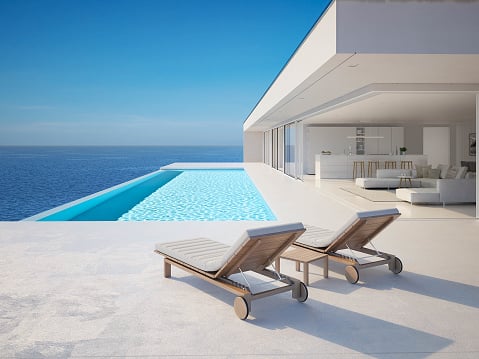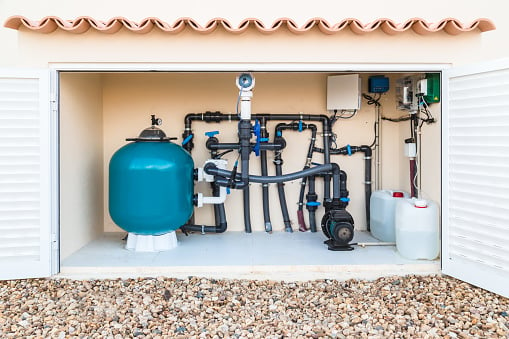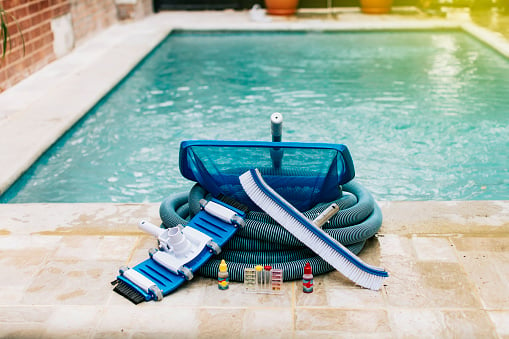BLOGS
Saltwater Pools For Your Luxury Home
Bringing the beach essence to your luxury home is possible now by making your regular swimming pool into a saltwater pool. It is becoming one of the must-have amenities to luxury developments. Saline or saltwater is thought to be healthier, more environmentally friendly, and exceptionally enjoyable for swimming. Instead of using traditional chlorine for sanitization, saltwater pools use a salt chlorinator system to convert salt into chlorine. Although they demand a larger initial investment, salt water pools appear to have many advantages which will be mentioned in this article.
If you are planning to build one for your luxury home, here’s everything you need to know about having saltwater pools including the cost, maintenance, and even the pros and cons.
How does the water system works for Saltwater pools?
A saltwater pool is a form of swimming pool that sanitizes the water using a salt chlorinator system rather than traditional chlorine. The salt chlorinator transforms salt into chlorine by means of an electrolysis process, supplying a steady stream of chlorine to maintain the pool’s cleanliness and swimming safety.

A salt cell or the chlorine generator that is included into the pool’s piping system serves as the salt chlorinator. It sanitizes the water by dissolving chlorine gas in it after converting dissolved salt into chlorine gas using a low voltage electrical current. A perpetual cycle is created when the chlorine is eventually converted back into salt.
Are Saltwater Pools high maintenance?
While saltwater pools have lower chlorine maintenance requirements, they still require attention to keep the water balanced, clear, and safe for swimming. The overall maintenance needs can vary depending on factors such as pool size, usage, and environmental conditions. Saltwater pools generally require less maintenance compared to traditional chlorine pools, but they still require some attention to ensure optimal performance. Here are the top 5 considerations for maintaining a saltwater pool:
-
Water Testing
Regular water testing is necessary to monitor and maintain proper water chemistry. You need to test the pH, chlorine levels, and salt levels periodically. Most pool supply stores can provide testing kits or offer water testing services.
-
Salt Levels
Saltwater pools rely on the presence of dissolved salt to generate chlorine. You may need to add salt to the pool if the levels drop due to water loss through evaporation or splash-out. However, the need for salt additions is typically infrequent.
-
Chlorine and pH Levels
While the salt chlorinator system generates chlorine, you still need to monitor and adjust the chlorine levels to ensure proper sanitation. Additionally, maintaining the appropriate pH balance is crucial for the effectiveness of chlorine and overall water quality.
-
Cleaning the Salt Cell or Chlorine Generator
The generator or the salt cell in the salt chlorinator system can accumulate mineral deposits over time, which can reduce its efficiency. Regularly inspect and clean the cell according to the manufacturer’s instructions to prevent scaling and ensure optimal chlorine production.
-
Filtration and Circulation
Proper filtration and circulation are essential for any pool, including saltwater pools. Regularly clean or backwash the pool filter, check the pump and skimmer baskets, and ensure that water is circulating effectively to remove debris and maintain water clarity.

The Pros and Cons of a Saltwater Pool
Before starting to construct a saltwater pool, you might want to know the balance of the pros and cons of having one.
Pros
-
Reduced Skin and Eye Irritation
Saltwater pools typically have lower chlorine levels compared to traditional chlorine pools, which can result in less irritation and harm to your eyes and skin as you swim.
-
Lower Chlorine Smell
Saltwater pools tend to produce less chlorine odor compared to traditional pools, providing a more pleasant swimming experience.
-
Convenience
With a salt chlorinator system, you don’t need to handle and add chlorine manually. The system generates chlorine automatically, making maintenance and water sanitization more convenient.
-
Lower Maintenance
Saltwater pools generally require less maintenance compared to traditional chlorine pools. The salt chlorinator system helps regulate chlorine levels, reducing the need for frequent adjustments. This can result in time and cost savings.
-
Potential Cost Savings
Although the initial installation costs of a saltwater pool may be higher due to the salt chlorinator system, the long-term maintenance costs can be lower. You may require fewer chemicals for water treatment, potentially reducing ongoing expenses.
Cons
-
Higher Initial Cost
Saltwater pools can have a higher upfront cost compared to traditional chlorine pools. This is primarily due to the installation of the salt chlorinator system and any necessary modifications to the pool’s plumbing.
-
Cell Maintenance
The salt cell in the salt chlorinator system can accumulate mineral deposits over time, requiring periodic cleaning to maintain efficiency. Neglecting this maintenance task can impact chlorine production and necessitate cell replacement.
-
Salt Corrosion Potential
The salt in saltwater pools can accelerate corrosion of certain pool components, such as metal fixtures, ladders, or nearby outdoor furniture. It’s important to choose corrosion-resistant materials and regularly inspect and maintain these elements.
-
Impact on Landscaping
Splashing or overflowing saltwater from the pool can potentially affect nearby landscaping, especially if sensitive plants or grass are exposed to saltwater regularly. Adequate drainage systems or protective measures may be necessary to mitigate these effects.
-
Saltwater Sensation
While many people enjoy swimming in saltwater pools, the sensation of the water can differ from traditional freshwater pools. Some individuals may find the slight saltiness, like the ocean water, less appealing or unfamiliar.

Is Salt water Pool worth it?
If you or your family members have sensitive skin or are prone to skin and eye irritation from traditional chlorine pools, the reduced chlorine levels in saltwater pools may provide a more comfortable swimming experience. The gentler water may be worth it if you prioritize comfort. And if you prefer a pool with a milder scent or want to minimize the smell in your luxury home, a saltwater pool may be worth it for the improved air quality.
In terms of investment, the initial installation costs of a saltwater pool may be higher but there can be potential cost savings in the long run. With proper maintenance, you may require fewer chemicals and experience lower ongoing expenses. Assessing your budget and weighing the upfront costs against potential long-term savings can help determine if it’s worth it financially.
Ultimately, the decision comes down to personal preference. Some individuals simply enjoy the experience of swimming in saltwater pools, finding the slightly salty water appealing and reminiscent of the ocean water. If you value this unique sensation and find it enhances your enjoyment of the pool, a saltwater pool may be worth it for you.
Build the Pool of your Dreams at Daang Hari
Depending on who you ask and where you live, installing a pool is always a good or bad investment. But for Forresta Luxury Lots in Daang Hari, it will be nothing but good! You need to look no further than here if you’re looking for a private estate where you can start constructing your saltwater swimming pool. In hot areas like this city, adding a pool increases the appeal of your house to potential buyers seeking refuge from the heat.
You can take a virtual tour of Brittany Corporation’s Daang Hari subdivisions and other luxury communities located in strategic areas of the nation if you’d like to learn more about what it has to offer. Additionally, you can also consult with our partner professionals or contractors experienced in saltwater pools. They can provide more specific information, assess your specific circumstances, and help you make an informed decision based on your preferences, budget, and maintenance considerations.
Suggested Read: Choosing This Perfect Luxury Real Estate For Your Summer Lifestyle
Suggested Read: Pros And Cons Of Glass Houses For Summer Living
Suggested Read: Swimming Pool Patio Ideas For Your Luxury Home
Suggested Read: Pros And Cons Of A Condo For Summer Living















